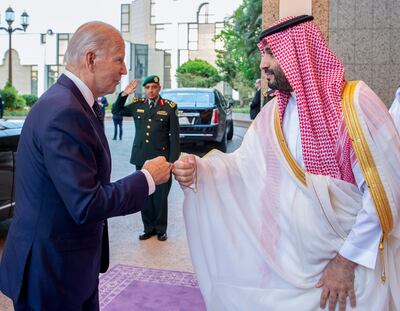A series of announcements last week, including one that golf’s traditional circuits will partner with the LIV breakaway series to form a commercial entity to unify the sport, has made a lot of people sit up and take notice. Taken together, these announcements speak to Saudi Arabia’s global ambitions. They also serve as a reminder that economic power is inexorably shifting eastward – and that the West has to learn to live with this reality.
For a few years now, the kingdom has been following in the steps of its Gulf neighbours – notably, the UAE, Bahrain and Qatar – by investing billions of dollars in sport. In 2021, the state-controlled Public Investment Fund (PIF) took over Newcastle United, the English Premier League football club. By this time, Saudi Arabia had already associated itself with Formula 1, Formula E, and boxing and tennis events.
Last December, the Saudi Pro League club Al Nassr acquired the services of Portugal’s Cristiano Ronaldo, considered one of the world’s two best footballers (the other being Argentina’s Lionel Messi, who himself came close to signing for a Pro League side before being lured away to the US).
But few would have anticipated the announcement made on June 4, that the PGA Tour and the DP World Tour (previously called the European Tour) were ending their bitter, months-long feud with the Saudi-backed LIV Golf and will be brought under a yet-to-be-named entity – which will, in turn, operate under the auspices of the PIF.
On the same day, it was confirmed that the French superstar Karim Benzema will join Ronaldo in Saudi Arabia. News broke thereafter that the PIF had acquired four of the most prominent Saudi Pro League clubs. A spending bonanza is expected, as these clubs scout for the best talents money can buy from around the world. The stated aim is to make the Pro League one of the top 10 football leagues in the world, with the kingdom rumoured to be preparing a bid to host either the 2030 Fifa World Cup or the tournament four years later.

So, why is Saudi Arabia pouring eye-watering sums of money into sport?
One obvious explanation is that, as part of its Vision 2030 strategic framework, the government is making efforts to transform the country, by opening up its largely conservative society and diversifying its oil-based economy. The PIF, one of the largest sovereign wealth funds in the world, and which has $650 billion in assets under management, aims to reach the $1 trillion mark in the foreseeable future. As it diversifies its portfolio, sport is one means for it to realise its growth prospects.
Sport is also a tool that a country often uses to increase its soft power. Aside from the clear commercial incentives, hosting a competition puts the said country on the world map in a different way. Saudi Arabia is home to Islam’s holiest sites, and it is the world’s largest oil exporter. But now it is offering something new, too, particularly to the world’s youth, by inviting them to the country to take in the sights and watch major sporting events.
Surely, these initiatives shouldn’t be frowned at, especially when the profound effect they have had in the UAE and other Gulf countries is a proven fact. Yet, reactions to these developments, especially the golf partnership announcement, from several quarters in the West – a part of the world that would ordinarily support the opening up of societies and markets – have been largely very critical.
The golf fraternity is disappointed, and to some extent understandably so. The players had no idea of the plan, nor apparently did most of the board members in each of the three organisations. LIV chief executive Greg Norman himself was apprised of it only moments before the rest of the world was informed.
The secrecy is stunning, particularly given how much the deal is expected to change men’s golf. According to some experts, the new arrangement amounts to the acquisition of an entire sport by a country. Naturally, several questions arise, over the uncertain future of the tournaments to the format of the sport itself to player reconciliation and compensation.

For the world of golf to maintain scepticism, healthy or otherwise, is fair game. But the negativity from the West more broadly – and particularly from the media and political circles – is a different matter. The Wall Street Journal, a pro-markets newspaper, has for instance described the deal as a “hostile takeover”. An article it published even characterised it as the result of a personality clash between US President Joe Biden and Saudi Crown Prince Mohammed bin Salman, the driving force behind Vision 2030.
Pointing to the kingdom’s lack of golfing heritage, as some have, might be one thing. But it is rich to make claims of a hostile takeover given the PGA Tour’s own controversial history, when it broke away from an already existing organisation in 1968 following what's been described as “an audacious power grab”.
It is just as hypocritical for western politicians to allege Saudi “sportswashing” and “greenwashing” when their own governments struggle to wean their countries from oil and gas. Just three months ago, Mr Biden – a member of the Democratic Party, which takes a harder line on fossil fuels – approved an oil-drilling project in Alaska.
Meanwhile another Democrat, US Senator Richard Blumenthal, is looking into the Saudi government’s role in the golf deal in the face of, as he sees it, “the risks posed by a foreign government entity assuming control over a cherished American institution”. Mr Blumenthal, it’s worth pointing out, has a track record of criticising Arab countries. The US Congress may have the mandate to look into the deal, but it appears that some western politicians are taking an adversarial position towards some Arab countries.
Whether or not this is another symptom that we are foraying into a post-globalisation world, one thing is clear: Saudi Arabia’s emergence as a sporting power is capitalism at work. It is the very economic system that has girded western prosperity for several centuries. It just so happens that the fulcrum of global economic growth, as a consequence of capitalism in all its forms, has moved from the West to Asia.
Understanding this make it easier for us to conclude that shake-ups, such as the one golf is experiencing, are inevitable – whether we like it or not.





